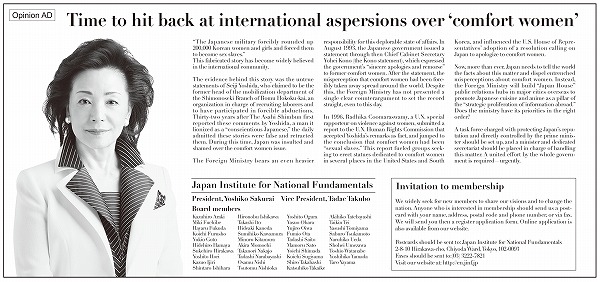“The Japanese military forcibly rounded up 200,000 Korean women and girls and forced them to become sex slaves.”
This fabricated story has become widely believed in the international community.
The evidence behind this story was the untrue statements of Seiji Yoshida, who was said to be the former head of the mobilization department of the Shimonoseki Branch of Romu Hokoku-kai, an organization in charge of recruiting laborers and claimed to have participated in forcible abductions. Thirty-two years after The Asahi Shimbun first reported these comments by Yoshida, a man it lionized as a “conscientious Japanese,” the daily admitted these stories were false and retracted them. During this time, Japan was insulted and shamed over the comfort women issue.
The Foreign Ministry bears an even heavier responsibility for this deplorable state of affairs. In August 1993, the Japanese government issued a statement through then Chief Cabinet Secretary Yohei Kono (the Kono statement), which expressed the government’s “sincere apologies and remorse” to former comfort women. After the statement, the misperception that comfort women had been forcibly taken away spread around the world. Despite this, the Foreign Ministry has not presented a single clear counterargument to set the record straight, even to this day.
In 1996, Radhika Coomaraswamy, a U.N. special rapporteur on violence against women, submitted a report to the U.N. Human Rights Commission that accepted Yoshida’s remarks as fact, and jumped to the conclusion that comfort women had been “sexual slaves.” This report fueled groups seeking to erect statues dedicated to comfort women in several nations, and influenced the U.S. House of Representatives’ adoption of a resolution calling on Japan to apologize to comfort women.
Now, more than ever, Japan needs to tell the world the facts about this matter and dispel entrenched misperceptions about comfort women. Instead, the Foreign Ministry will build “Japan House” public relations hubs in major cities overseas to promote Japanese cuisine and anime as a pillar of the “strategic proliferation of information abroad.” Does the ministry have its priorities in the right order?
A task force charged with protecting Japan’s reputation and directly controlled by the prime minister should be set up, and a minister and dedicated secretariat placed in charge of handling this matter. A united effort by the whole government is required—urgently.
↑CLICK HERE (PDF full text)


